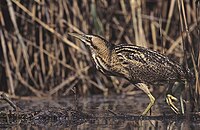Eurasian bittern: Difference between revisions
Weird Bird (talk | contribs) Headers |
No edit summary |
||
| Line 36: | Line 36: | ||
[[Category:Bitterns]] |
[[Category:Bitterns]] |
||
[[Category:Wading birds|bittern, great]] |
|||
[[bg:Голям воден бик]] |
[[bg:Голям воден бик]] |
||
Revision as of 16:19, 17 September 2006
| Great Bittern | |
|---|---|

| |
| Scientific classification | |
| Kingdom: | |
| Phylum: | |
| Class: | |
| Order: | |
| Family: | |
| Genus: | |
| Species: | B. stellaris
|
| Binomial name | |
| Botaurus stellaris (Linnaeus, 1758)
| |
The Great Bittern (Botaurus stellaris) is a wading bird of the heron family Ardeidae.
Description
It is a large, chunky, brown bird, very similar to the American Bittern, Botaurus lentiginosa. It is 69-81 cm (24"-34") in length, with a 100-130 cm wingspan.
Distribution
It is declining in much of its temperate European and Asian range. It is resident in the milder west and south, but migrates south from areas where the water freezes in winter.
Behaviour
This bittern is usually well-hidden in Phragmites reedbeds. Usually solitary, it walks stealthily seeking amphibians and fish. If it senses that it has been seen, it becomes motionless, with its bill pointed upward, causing it to blend into the reeds. It is most active at dawn and dusk.
Its folk names include barrel-maker, bog-bull, bog hen, bog-trotter, and butterbump, mostly refer to the mating call of the male, which is a deep fog-horn or bull-like boom. The Latin for bittern, Botaurus, also refers to the bull. The other part of its scientific name, stellata is the Latin for starry, in reference to its plumage.
The Great Bittern is one of the species to which the Agreement on the Conservation of African-Eurasian Migratory Waterbirds (AEWA) applies.
References
- Template:IUCN2006 Database entry includes justification for why this species is of least concern
